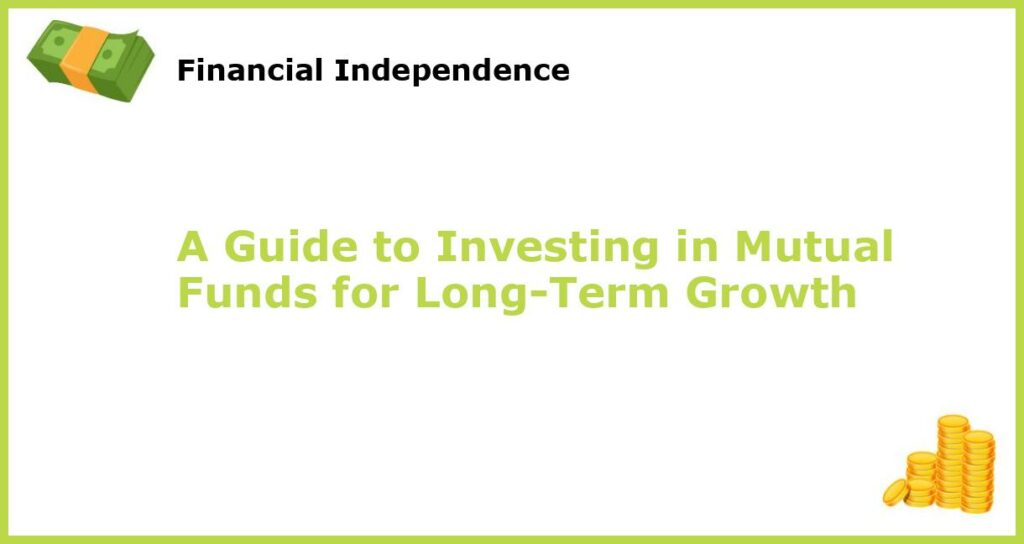Are you looking for a way to diversify your investment portfolio with ease? Then you should consider investing in mutual funds. Mutual funds are investment vehicles that pool money from several investors and invest in different securities such as stocks, bonds, and commodities. This type of investment offers several benefits that make it an ideal choice for those seeking long-term growth. In this article, we will discuss the different types of mutual funds, choosing the right mutual fund, fees and expenses, risk management, performance evaluation, taxation, and investing in mutual funds vs. individual stocks. Read on to learn more about mutual funds and how you can use them to achieve long-term growth.
Benefits of Mutual Funds

Mutual funds provide several benefits to investors, including diversification and access to professional fund managers. First, mutual funds allow investors to spread their investments across different securities, reducing the risk of losing all their money on one stock. Additionally, mutual funds give investors access to professional fund managers who make investment decisions on their behalf. This means that even those with no investment knowledge can benefit from investing in mutual funds. Professional fund managers have the expertise to identify attractive investment opportunities, monitor the portfolio regularly and manage risks effectively.
Types of Mutual Funds

There are different types of mutual funds with varying investment objectives. Equity funds invest in the stock market to provide long-term capital appreciation. These funds are ideal for those seeking growth opportunities in the long run. Fixed income funds invest in fixed income securities such as government bonds and corporate bonds to provide a steady income stream. These funds are ideal for those looking for regular income. Balanced funds aim to balance risks and rewards by investing in both equity and fixed income securities. These funds are ideal for those who want to maintain a balance between growth and stability. Index funds track a specific index and provide investors with similar returns to the overall market. These funds are ideal for those looking for low-cost investments that provide similar returns to the overall market.
Choosing the Right Mutual Fund

Choosing the right mutual fund requires investors to consider their investment objectives, risk tolerance, and investment horizon. Those seeking long-term growth should consider investing in a diversified equity fund. However, those looking for regular income should consider a fixed income fund. Index funds are ideal for those looking for low-cost investments that provide similar returns to the overall market. It’s important to evaluate a mutual fund’s investment strategy to ensure it aligns with your investment goals. Additionally, investors should evaluate the fund’s track record, expense ratios, and holdings to gain a better understanding of its investment strategy.
Fees and Expenses

Mutual funds charge fees and expenses that investors should be aware of. These fees reduce the fund’s performance, making it important to understand them before investing. Expense ratios are the fees charged by the fund managers to cover their expenses. Load fees are sales charges for buying or selling the fund. Investors can choose between no-load funds or load funds depending on their investment goals and preferences. No-load funds don’t charge a sales charge, while load funds usually charge a sales charge that is either front-end, back-end, or level-loaded.
Risk Management

No investment is risk-free, and mutual funds are no exception. Investors should evaluate the risks associated with investing in mutual funds and develop a plan to manage those risks. Diversification is an effective risk management strategy that involves investing in different securities to spread the risk. Regular monitoring of the portfolio can help investors identify any potential risks and take appropriate action. Additionally, rebalancing the portfolio can help investors maintain their desired asset allocation and reduce any unnecessary risks to the portfolio.
Performance Evaluation

Investors should evaluate the performance of their mutual funds regularly to ensure they meet their investment objectives. Reviewing the fund’s returns, expense ratios, and portfolio holdings can help investors determine if they should continue investing in the fund or consider alternatives. Additionally, investors can use benchmark indices to evaluate the performance of their mutual fund. Benchmark indices are indexes that represent the performance of a specific market or industry sector.
Taxation

Investors should be aware of the tax implications of investing in mutual funds. Mutual funds distribute capital gains and dividends to investors, which are subject to taxation. Additionally, investors may face taxes on gains realized when selling shares of the fund. Investors can reduce their tax liability by holding the fund in a tax-deferred account such as an IRA or 401(k). IRA and 401(k) accounts offer tax-deferred growth, which means investors don’t have to pay taxes on their investment earnings until they withdraw the funds.
Investing in Mutual Funds vs. Individual Stocks

Investing in individual stocks requires knowledge, research, and time commitment that not all investors have. Mutual funds, on the other hand, provide a simple and hassle-free way to invest in a diversified portfolio managed by professionals. While individual stocks may provide higher returns, mutual funds provide a safer investment opportunity for those with limited investment knowledge. Mutual funds offer instant diversification, which means investors don’t have to worry about investing in individual stocks and losing all their money in one stock. Additionally, mutual funds provide access to professional fund managers who make investment decisions on behalf of the investors.
Long-Term Growth Strategy
A long-term investment strategy is essential for anyone looking to invest in mutual funds for long-term growth. Investors should develop an investment plan that aligns with their investment goals, risk tolerance, and investment horizon. Consistent investments over a long period can lead to significant wealth accumulation. Investing in mutual funds requires patience and discipline. Investors should focus on their long-term goals, and not be swayed by short-term market fluctuations. Additionally, regular monitoring and rebalancing of the portfolio can help investors maintain their desired asset allocation and reduce any unnecessary risks to the portfolio.
The Bottom Line
Mutual funds offer a simple and convenient way to invest in a diversified portfolio of securities managed by professionals. Investors can choose from different types of mutual funds that meet their investment objectives, risk tolerance, and investment horizon. While mutual funds come with fees and risks, a well-planned long-term investment strategy can provide significant growth potential. So, if you are looking for a way to diversify your investment portfolio and achieve long-term growth, then investing in mutual funds may be an ideal option for you.







